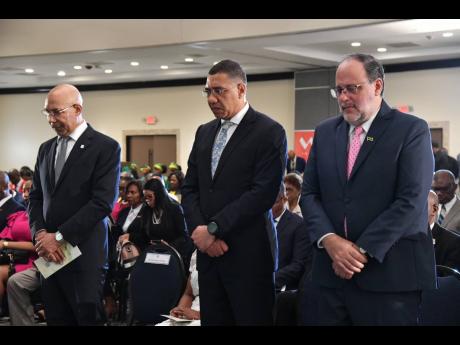Kristen Gyles | Why ‘what goes for the MP doesn’t go for the PM’
The Opposition leader’s recent confirmation that he holds British citizenship has opened up an important conversation on dual citizenship in parliament. At face value, the conversation seems to surround two of the questions posed to 1,020 Jamaicans in the poll recently conducted by Bluedot Insights between May 22 and June 5 of this year.
Those surveyed were asked if dual citizens should be allowed to sit in parliament. Just over 66 per cent responded in the affirmative. Meanwhile, when asked if a dual citizen should be allowed to occupy the role of prime minister, roughly 64 per cent said no.
If the findings are to be taken as being representative of the overall population, it would appear that the majority of us have no issue with dual citizenship in parliament, so long as the dual citizen is not prime minister (PM). Some have argued that such a position is latently inconsistent, considering the PM is an elected member of parliament (MP) like his peers. If an MP can hold dual citizenship, why can’t the prime minister?
In an ideal world, none of our political leaders would be dual citizens. We would love to have a full slate of parliamentarians who have no interest or pride in any other country and who accrue civic benefits only from Jamaica. We would also love to have a full slate of parliamentarians who were born and raised in Jamaica and whose parents and grandparents were born and raised in Jamaica. That would feel good. It would also make us feel better about the authenticity and genuineness of their leadership. But let’s face it – the optics of a matter and what feels good should not trump what is fair, reasonable and pragmatic.
FACE CONFLICT
Is there any scenario in which an MP or senator who holds dual citizenship could actually face a conflict in the effective discharge of their duties by virtue of being a citizen of another country? The reality is that the individual may have ‘split loyalties’ (however lopsided the split), but that split in loyalties can hardly ever translate into actual injury to the country’s business. MPs are just not that powerful and as a result, any bit of interest they may have in any other country’s affairs is really not consequential at all. Frankly, many of them already have their loyalties split between the country and their respective parties anyway. But that’s a topic for another time.
On the other hand, should the prime minister have a tinge of allegiance to any other national power, it could mean destruction for the country. For those who argue that there is no principled basis for holding the prime minister to a different standard than his or her peers in parliament, there is a need to highlight the extent of the powers the prime minister actually holds.
The PM composes the cabinet, entirely at will, and deposes of its members whenever and however he chooses. No explanation, no justification. In like manner, the PM creates, entirely at will, whatever new government ministries he chooses. No explanation, no justification.
The PM, and the cabinet he chooses, have the power to instigate war at any time and to deploy Jamaica’s armed forces for any reason. Although it is the governor general who will ultimately make any such declaration, it is done on the advice of the executive. We also depend on the prime minister, and his cabinet, to represent us on the international stage where many controversial proposals are floated around for worldwide adoption. Of course, such proposals often favour some countries to the detriment of others. Where there are differences in the interests of countries, we would want to know that the prime minister has no incentive to waver in his commitment to defending the position and posture of the Jamaican people.
OPERATIVE HEAD
The prime minister is not just another representative. He is the operative head of the country and has everything to do with the direction the country takes. For this reason, what goes for the MP doesn’t always go for the PM.
The question now, is whether this is what we want. That is, one man with the whole country in his hands. Each election cycle, we leave our homes to vote for a representative for our respective constituencies and at the end of the day, the representative often proves himself or herself nothing more than a party puppet while most of the decision-making power rests with one individual we didn’t even vote for. That is the real issue.
MPs are voted in by constituents who want their representation on relatively localised issues. If it is felt that a candidate has split loyalties and may be compromised in his or her ability to give effective representation, all their constituents need to do is not vote them in. But we have absolutely no say regarding who the PM will be. The ‘winning’ party will elect a leader and the rest of us unaffiliated folks will be stuck with that individual as our PM for all of five years or until he or she decides they are ready to call the next election. This is just one of the many ways in which our current, party-centric electoral system has been keeping us from meaningful involvement in the selection of our leaders.
We hear that our constitution is being reformed. Will we by any chance be addressing the problems with the electoral system we copied from Britain?
Kristen Gyles is a free-thinking public affairs opinionator. Send feedback to kristengyles@gmail.com and columns@gleanerjm.com.

